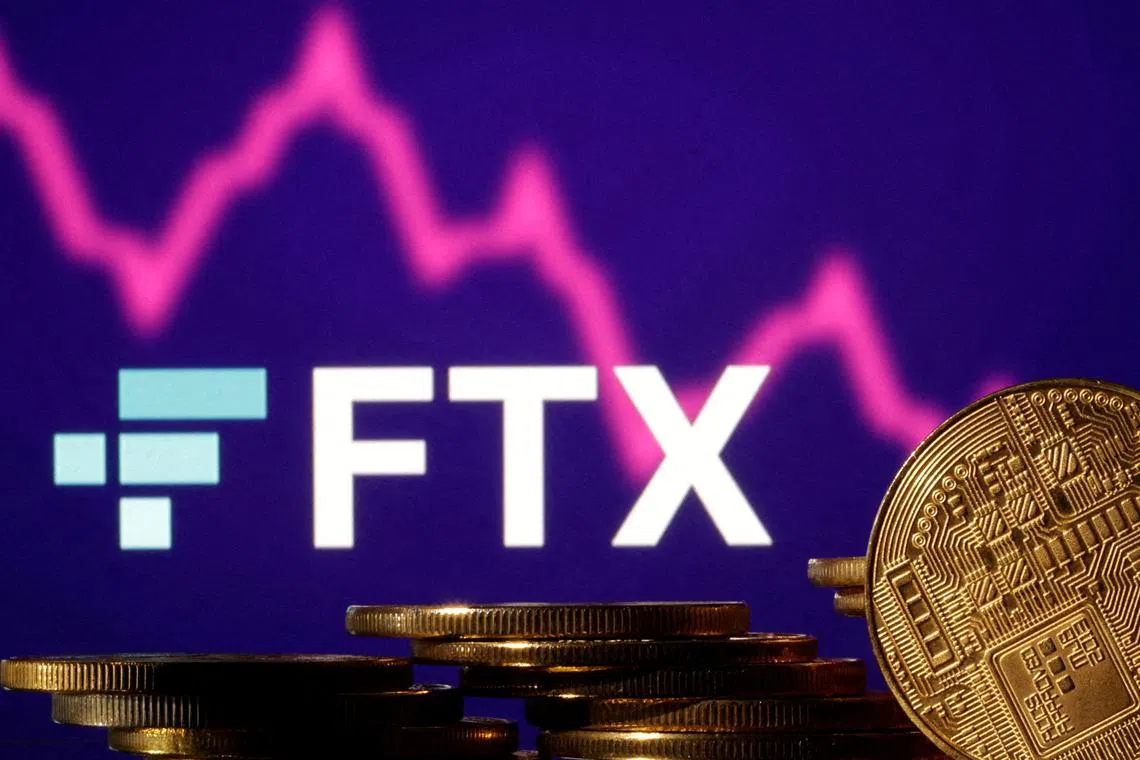Collapsed FTX owes nearly $4.3 billion to top 50 creditors: Court filing
Sign up now: Get ST's newsletters delivered to your inbox

FTX filed for bankruptcy on Nov 11 in one of the highest-profile crypto blow-ups, leaving an estimated one million customers and other investors facing total losses in the billions of dollars.
REUTERS
London - Cryptocurrency exchange FTX, which has filed for bankruptcy court protection in the United States, said it owes its 50 biggest creditors nearly US$3.1 billion (S$4.3 billion).
The exchange owes about US$1.45 billion to its top 10 creditors, it said in a court filing on Saturday, without naming them.
FTX and its affiliates filed for bankruptcy on Nov 11 in one of the highest-profile crypto blow-ups, leaving an estimated one million customers and other investors facing total losses in the billions of dollars.
The crypto exchange said on Saturday it has launched a strategic review of its global assets and is preparing for the sale or reorganisation of some businesses.
Meanwhile, moves by other cryptocurrency exchanges to reassure markets about their stability are having little effect on jittery users, who keep pulling funds from the venues.
Platforms from Binance to Crypto.com have made full or partial disclosures outlining their assets since FTX.com unravelled last week.
Yet clients’ stampede for the exits has persisted, with exchange reserves of Bitcoin, Ether and stablecoins falling sharply, according to data from CryptoQuant.
The problem is that many so-called proof of reserves published so far have left out liabilities, have not been vetted by outside auditors and do not provide clarity on which, if any, of the assets that the exchanges hold have been pledged as collateral for loans.
With the disarray in FTX’s finances now laid bare to the broader public, anything short of a complete accounting will likely fail to fully restore confidence, market watchers said.
“The issue is that proof of reserves are a snapshot in time of funds in certain wallets,” said Ms Maya Zehavi, a cryptocurrency angel investor.
“People need to verify the exchange’s total liabilities and that no client tokens were pledged as collateral, as well as the health of those assets put up as collateral.”
A full-blown crisis of confidence in exchanges would have dire consequences for the crypto industry because the venues often operate as brokers, custodians and clearing houses – meaning the collapse of one platform can kick off a daisy chain of failures reaching into every corner of crypto.
Contagion from FTX is already spreading.
Last Wednesday, crypto brokerage Genesis said it has been forced to suspend redemptions at its lending unit and Gemini Trust delayed redemptions in its Earn programme. BlockFi, which has close links to FTX US, is preparing to file for bankruptcy, Bloomberg News reported last week.
In FTX’s case, oversight and record-keeping of assets were so poor that new chief executive John Ray III compared it unfavourably to Enron, whose liquidation he oversaw.
Advisers have located “only a fraction” of the digital assets that they hope to recover during the Chapter 11 bankruptcy, Mr Ray said.
The fact that FTX was able to keep such glaring deficiencies hidden for so long shows that accounts must be audited and assets valued by third parties, some crypto executives said.
Still, audits may only be part of the solution. Some of the risks in crypto stem from the way the nascent market is structured, with exchanges carrying out functions that in traditional finance are distributed between multiple entities – the majority of which are regulated, and many of which are also publicly traded.
This concentration of functions in crypto could lead to conflicts of interest and lack of transparency regarding client assets, said Mr Jack McDonald, CEO of PolySign, which owns a crypto custodian and fund administrator.
Some regulators are prodding the industry in that direction.
Singapore’s central bank has proposed that exchanges must properly segregate customers’ assets and disclose what would happen to them if the firm becomes insolvent. It has also proposed that firms mitigate any potential conflicts of interest arising from the multiple roles they perform.
“We might see centralised exchanges face some new requirements, such as the need to separate custody of client assets from the exchange itself,” said Mr Frederic Lardieg, a partner at Mubadala Capital Ventures, which co-led a US$70 million funding round in crypto payments company Ramp in November.
Many traders are not waiting to find out. Exchange reserves of Bitcoin and Ether are at their lowest levels since 2018, data from CryptoQuant shows.
Stablecoin reserves have slipped to the lowest since January, according to the data, which measures the number of tokens rather than the dollar value. REUTERS, BLOOMBERG


